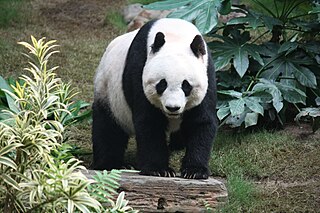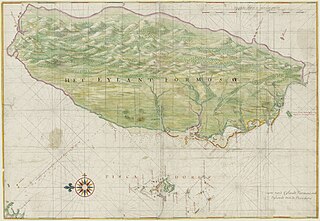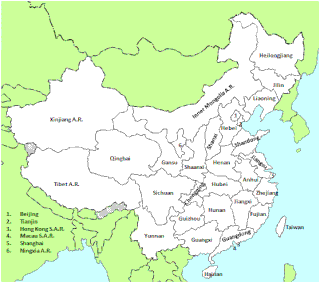
The giant panda, sometimes called a panda bear or simply panda, is a bear species endemic to China. It is characterised by its bold black-and-white coat and rotund body. The name "giant panda" is sometimes used to distinguish it from the red panda, a neighboring musteloid. Though it belongs to the order Carnivora, the giant panda is a folivore, with bamboo shoots and leaves making up more than 99% of its diet. Giant pandas in the wild occasionally eat other grasses, wild tubers, or even meat in the form of birds, rodents, or carrion. In captivity, they may receive honey, eggs, fish, yams, shrub leaves, oranges, or bananas along with specially prepared food.

Taiwan, officially known as the Republic of China (ROC), is governed in a framework of a representative democratic republic under a five-power system first envisioned by Sun Yat-sen in 1906, whereby under the constitutional amendments, the President is head of state and the Premier (President of the Executive Yuan) is head of government, and of a multi-party system. Executive power is exercised by the Executive Yuan. Legislative power is vested primarily in the Legislative Yuan. The judiciary is independent of the executive and the legislature. In addition, the Examination Yuan is in charge of validating the qualification of civil servants, and the Control Yuan inspects, reviews, and audits the policies and operations of the government. The party system is currently dominated by two major parties: the Kuomintang (KMT), which broadly favors maintaining the constitutional framework of the Republic of China Constitution and deepened economical cooperation with mainland China, and the Democratic Progressive Party (DPP), which broadly favors de jure Taiwanese Independence, and the eventual abolition of the ROC Constitution in favor of creating a "Taiwanese Republic."
The Three Links or Three Linkages was a 1979 proposal from the National People's Congress of the People's Republic of China (PRC) to open up postal, transportation, and trade links between Mainland China and Taiwan, with the goal of unifying Mainland China and Taiwan.

As a result of the surrender and occupation of Japan at the end of World War II, the islands of Taiwan and Penghu were placed under the governance of the Republic of China (ROC), ruled by the Kuomintang (KMT), on 25 October 1945. Following the February 28 massacre in 1947, martial law was declared in 1949 by the Governor of Taiwan, Chen Cheng, and the ROC Ministry of National Defense. Following the end of the Chinese Civil War in 1949, the ROC government retreated from the mainland as the Chinese Communist Party (CCP) proclaimed the establishment of the People's Republic of China. The KMT retreated to Taiwan and declared Taipei the temporary capital of the ROC. For many years, the ROC and PRC each continued to claim in the diplomatic arena to be the sole legitimate government of "China". In 1971, the United Nations expelled the ROC and replaced it with the PRC.

This is a timeline of the Republic of China.
The 1992 Consensus is a political term referring to the alleged outcome of a meeting in 1992 between the semiofficial representatives of the Chinese Communist Party (CCP)-led People's Republic of China (PRC) of mainland China, and the Kuomintang (KMT)-led Republic of China (ROC) of Taiwan. They are often credited as creating a diplomatic basis for semi-official cross-strait exchanges which began in the early 1990s and is a precondition set by the PRC for engaging in cross-strait dialogue.

Chen Deming is a former the President of Association for Relations Across the Taiwan Straits of the People's Republic of China.

The 2005 Pan–Blue visits to mainland China were a series of groundbreaking visits by delegations of the Kuomintang (KMT) and their allied Pan-Blue Coalition to mainland China. They were hailed as the highest level of exchange between the Chinese Communist Party and the Kuomintang since Chiang Kai-shek and Mao Zedong met in Chongqing, China on August 28, 1945.

Cross-Strait relations are the relations between China mainland and Taiwan.
Panda diplomacy is the practice of sending giant pandas from China to other countries as a tool of diplomacy. From 1941 to 1984, the Chinese government gifted pandas to other countries. Since 1984, they have been leased rather than gifted due to a PRC policy change.

Tsai Ing-wen is a Taiwanese politician who has been serving as president of the Republic of China (Taiwan) since 2016. A member of the Democratic Progressive Party (DPP), Tsai is the first female president of Taiwan and the second to be born in Taiwan after the end of the Chinese Civil War in 1949. She served as chair of the DPP from 2020 to 2022, from 2014 to 2018, and from 2008 to 2012.

The Taipei Zoo, sometimes referred to as the Muzha Zoo, is a public zoological garden in Wenshan District, Taipei, Taiwan. It is the most famous zoological garden in Taiwan and a leader in conservation, research and education, and recreation. It is one of the largest zoos in Asia, with a total area of 165 hectares, of which more than 90 ha are developed.

Hua Mei is a female giant panda. She is the first giant panda cub to survive to adulthood in the United States. She was born to Bai Yun (mother) and Shi Shi (father) at the San Diego Zoo. Millions of people around the world watched Hua Mei grow up via the zoo's Panda Cam.

The Economic Cooperation Framework Agreement (ECFA) is a free trade agreement (FTA) between the governments of the People's Republic of China and the Republic of China, that aims to reduce tariffs and commercial barriers between the two sides, as well as improve cross-strait relations.
The Second Chen–Chiang summit was part of a series of the Chen-Chiang summit of cross-strait meetings. It was the first major meeting between the Association for Relations Across the Taiwan Straits (ARATS) and Straits Exchange Foundation (SEF) leaders in Taiwan. The meeting lasted from November 3 to 7, 2008 in Taipei, Taiwan.

Yuan Zai is a female giant panda born at the Taipei Zoo on July 6, 2013. She is the first panda cub born in Taiwan, to parents Tuan Tuan and Yuan Yuan by artificial insemination. As Tuan Tuan and Yuan Yuan were sent to Taiwan from People's Republic of China in exchange for two Formosan sika deer and two Taiwan serows, Yuan Zai does not need to be returned.

Bao Bao is a female giant panda cub who was born at the National Zoo in Washington, D.C. She lived at the Zoo for four years until February 2017. She is currently located at the China Conservation and Research Center for the Giant Panda in Sichuan Province. She is the sister of Tai Shan, Bei Bei and Xiao Qi Ji.
As of 2019, there are 27 zoos in 21 countries outside of mainland China, that have giant pandas. These zoos have contracts with China to house these pandas for a few years. The two exceptions are the three pandas held at Taipei Zoo, which are owned by the Taiwanese government, and one panda held in Mexico. Giant pandas are on the IUCN Red List so part of the reason these contracts exist between China and international zoos is to try to help the species reproduce before they are brought back to their native land. For this reason, pandas are treated very well.















